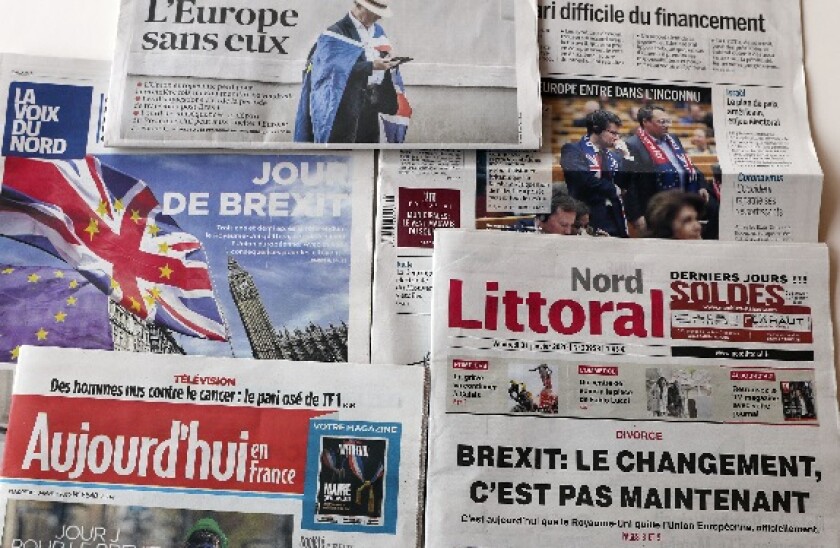Panagiotis Asimakopoulos and Eivind Friis Hamre of New Financial, a thinktank, have come out with a report on the state of EU capital markets. The full piece is only available upon request, but the think tank has highlighted what is sees as the main takeaways on its website.
It reports that net new bank lending to non-financial firms in the EU between March and June exceeded €300bn, almost five times higher than in the same period last year, as lenders supported companies in the crisis, with the help of government schemes.
While the amount of bank lending has been declining in Europe, outstanding lending in both the EU27 and the UK is at its highest point since 2009.
Capital markets also mediated €370bn of funding to around 800 firms in the EU between March and June, up 45% year on year.
New Financial also says that capital markets in the EU27 are half as developed — relative to GDP — as in the UK. The level of development varies, with the Netherlands, Sweden, Denmark and France leading the way, while Germany, Italy and Spain have less developed capital markets.
Keeping Tabs was also interested in one finding buried in the report, in light of the revelation this week that the UK government is prepared to break international law “in a specific and limited way”, according to Brandon Lewis, the secretary of state for Northern Ireland.
The government’s proposal for the relevant bill — which paves the way to it breaching the withdrawal agreement that prime minister Boris Johnson signed with the EU less than a year ago — has led to the resignation of the head of its legal department, and concern from both government allies and international officials.
Raphael Hogarth, associate at the Institute for Government think tank, warns the bill “will make uncomfortable reading for anyone who believes in the principle that governments are subject to the law, at home and abroad”.
But what’s the relevance to capital markets? Well, New Financial presents research showing a correlation between the depth of capital markets and what they call the “wider business, legal and regulatory environment”.
“Capital markets do not exist in a vacuum: they rely on a thriving private sector, an efficient and strong legal system, and high levels of trust in the rule of law,” the authors say.
Keeping Tabs decided to take a closer look at the data, kindly sent over by New Financial, to see what the correlation is for “government and regulation” in particular.
The think tank ranked EU countries and the UK on this, and said the following metrics were included: Perceived Corruption Index — Transparency International; Rule of Law Index — World Justice Project; Strength of Government Institutions Index — World Bank; and Quality of Insolvency Regime Index — World Bank.
It also ranked the countries by the depth of their capital markets.
It turns out there is quite a correlation (see chart).

Something for Johnson and co. to consider?
On the other side of the channel, the Capital Markets Union has a new face: Irish member of the European parliament Mairead McGuinness. She is set to become the next European commissioner for financial services, financial stability and the Capital Markets Union, replacing Valdis Dombrovskis (as GlobalCapital reported here).
At Politico, Maïa de La Baume takes a closer look at McGuinness. She has “little policy experience directly related to the wide and complex portfolio she is taking over,” de La Baume writes, although she notes that “she has extensive experience in the EU, and has worked with many commissioners past and present”.
Parts of McGuinness’s career took place a long way from glistening financial centres: she “became a TV sensation in rural Ireland”, while also editing the Irish Independent’s farming supplement.
Meanwhile, as Brexit negotiations get feisty — with those in financial services waiting to find out about equivalence agreements — the Commission has chosen to rope in someone with experience of combatting the Brexiteers.
According to de La Baume, “In the parliament, she is known for her tough-worded spats in the chamber with former MEP and Brexit champion Nigel Farage. Last January, after Farage gave his last speech in plenary and waved the British flag, McGuinness lashed out at him for breaking parliamentary rules (flag waving is banned in the EU chamber).”
Finally, historian Adam Tooze writes in The Guardian on a new focus at central banks, as they fight to prevent deflation.
He says that the US Federal Reserve’s recent shift to be less sensitive to a rise in inflation is an acknowledgement that “the bargaining power of labour is far lower than in the 1970s and the risk of an inflationary blowout remote”.
With the European Central Bank also pushing monetary policy boundaries, he adds: “What central banks do is becoming more complex, more diverse and more multipolar. What is emerging is a hybrid assemblage that combines market mechanisms with massive intervention and seemingly limitless credit. Its Frankenstein quality is undeniable, but what kind of monster it is, remains to be seen.”

